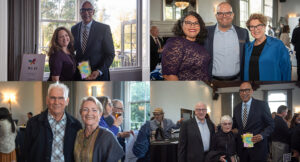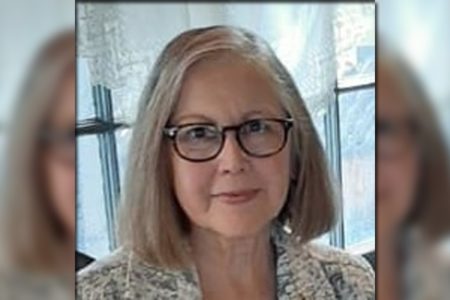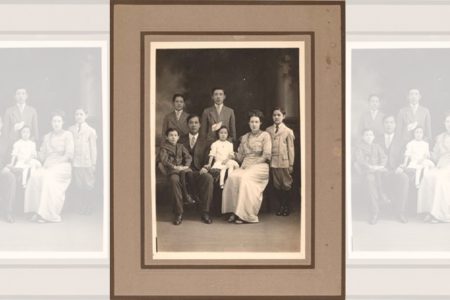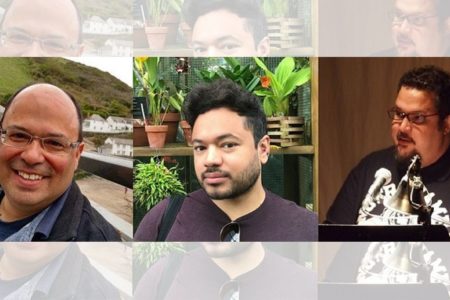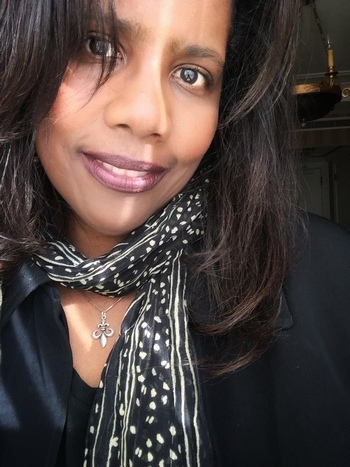
Lynell George
In these days of quarantined self-improvement, creative types–or those reigniting their artistic sides–have unlimited possibilities: online master classes, Ivy League courses via Zoom, and other high-powered–and potentially at high cost–experiences.
But making art doesn’t require extravagant trappings, contends Pasadena writer Lynell George, whose upcoming book chronicles the creative process of late MacArthur “genius” Octavia E. Butler. George will discuss her book and research at the Huntington archives, which hold Butler’s papers, in a free Zoom event from 4 to 5 p.m. Wednesday with William Deverell, a USC history professor and director of the Huntington-USC Institute for California and the West, and Karla Nielsen, curator of library collections at The Huntington. Make your reservation here.
A Handful of Earth, A Handful of Sky: The World of Octavia E. Butler (Angel City Press), which hits bookshelves Oct. 20, is more than just a biography of the famed science-fiction writer who spent years working and living in Pasadena. It provides a glimpse of the creative life, offering ideas about how to look, listen and breathe–how to be in the world.
“You don’t need access to graduate school or attend expensive writing retreats,” says George. “You can achieve greatness with modest means. It’s more about habits and focus and believing in yourself. And that may not be easy. There was a lot of struggle in Butler’s life, but she would get up the next morning and do it again and again and again.”
Indeed, the tools that made Butler a legendary writer were simple; hand-me-down books, repurposed diaries, journals, calendars and other everyday items. George spent countless hours in Butler’s archive at the Huntington Library (“pretty much nonstop since 2016”), scrutinizing personal items–including Post-it messages, old pencils, business cards, bills, letters and more–that propelled Butler’s art. “She used the same things we did, and she did something remarkable with them,” says George. “That stuck with me. She didn’t need fancy stuff.”
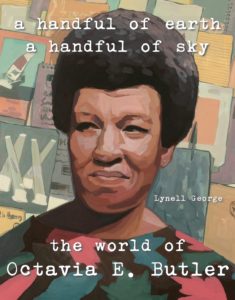 For George, these familiar objects offer an intimate look at Butler’s deeply private life, illuminating the common struggles of an artist trying to pay her bills, creating shopping lists and navigating day-to-day living. “She was very good about protecting her space and time around her writing. She put herself first, she calendared her time in and made contracts with herself and wouldn’t break them,” says George, adding that one contract allowed her a “reward with a movie on Saturday” if a goal was met.
For George, these familiar objects offer an intimate look at Butler’s deeply private life, illuminating the common struggles of an artist trying to pay her bills, creating shopping lists and navigating day-to-day living. “She was very good about protecting her space and time around her writing. She put herself first, she calendared her time in and made contracts with herself and wouldn’t break them,” says George, adding that one contract allowed her a “reward with a movie on Saturday” if a goal was met.
Growing up in L.A., George frequently saw Butler speak at bookstores around town, including Eso Won and the now-defunct Midnight Special. “My mother was an English teacher and an Octavia Butler fan,” says George.
As a staff writer for the Los Angeles Times, George often encountered Butler at events: in 2004, George flew up to Seattle to hear the venerable writer give the keynote address at the Black to the Future conference celebrating Black science-fiction and fantasy books. George asked Butler for an interview, but Butler passed away before it could be arranged.
For George, encountering Butler in the archives felt like an “unexpected way to spend time with her. You are not sitting across from the person you are interviewing, but you are looking over her shoulder as she is writing on a page, eavesdropping on her conversations. You get to see what she is picking up. You get to see all the busyness that went on in her brain.”
